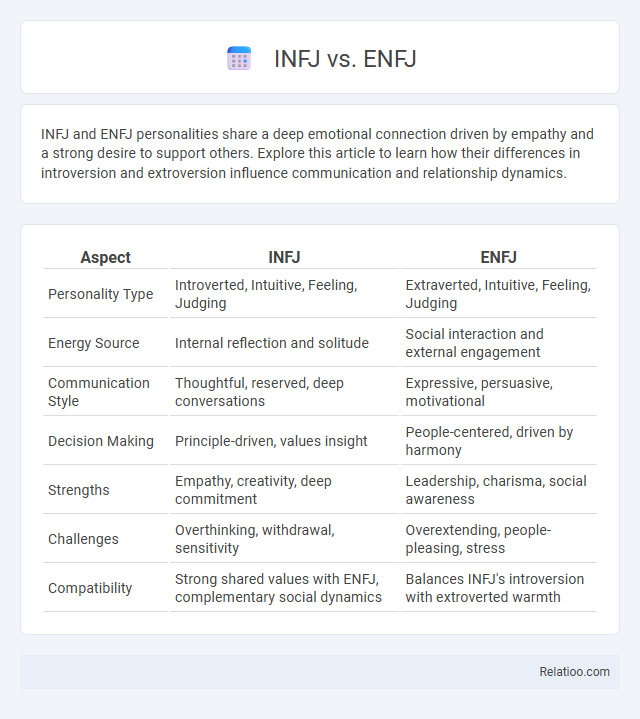INFJ and ENFJ personalities share a deep emotional connection driven by empathy and a strong desire to support others. Explore this article to learn how their differences in introversion and extroversion influence communication and relationship dynamics.
Table of Comparison
| Aspect | INFJ | ENFJ |
|---|---|---|
| Personality Type | Introverted, Intuitive, Feeling, Judging | Extraverted, Intuitive, Feeling, Judging |
| Energy Source | Internal reflection and solitude | Social interaction and external engagement |
| Communication Style | Thoughtful, reserved, deep conversations | Expressive, persuasive, motivational |
| Decision Making | Principle-driven, values insight | People-centered, driven by harmony |
| Strengths | Empathy, creativity, deep commitment | Leadership, charisma, social awareness |
| Challenges | Overthinking, withdrawal, sensitivity | Overextending, people-pleasing, stress |
| Compatibility | Strong shared values with ENFJ, complementary social dynamics | Balances INFJ's introversion with extroverted warmth |
Understanding INFJ and ENFJ: Core Differences
INFJ and ENFJ personalities differ primarily in their orientation toward the external world, with INFJs being introverted intuitives who prioritize internal reflection and deep understanding, while ENFJs are extroverted feelers focused on social connection and external harmony. INFJs often process emotions privately and seek meaningful solitude to recharge, whereas ENFJs actively engage with others to foster collaboration and support. Understanding these core differences highlights how INFJs prefer introspective problem-solving while ENFJs excel in empathetic leadership and group dynamics.
Personality Overview: INFJ vs ENFJ
INFJ personalities are introspective, empathetic, and driven by deep values, often excelling in thoughtful problem-solving and creative expression, while ENFJ types are outgoing, charismatic leaders who thrive on social interaction and inspiring others toward shared goals. Your INFJ traits may include a preference for solitude and reflective decision-making, contrasting with the ENFJ's natural ability to build relationships and motivate groups. Understanding these distinctions enhances your grasp of how each personality approaches communication, leadership, and emotional connection differently.
Cognitive Functions: How They Compare
INFJ and ENFJ personalities share the dominant Introverted Intuition (Ni) function, enabling deep insight and future-oriented thinking, but differ in their auxiliary functions, with INFJs using Extraverted Feeling (Fe) to connect empathetically inwardly and ENFJs using Fe to engage more actively in social environments. INFJs rely on Introverted Thinking (Ti) and Extraverted Sensing (Se) as tertiary and inferior functions, providing analytical depth and sensory awareness, whereas ENFJs use Introverted Sensing (Si) and Extraverted Thinking (Te) for internal detail retention and external organization, influencing their decision-making and reaction patterns. These cognitive function stacks result in INFJs reacting with introspective processing and nuanced emotional understanding, while ENFJs display outwardly responsive and proactive social adaptability.
Communication Styles of INFJ and ENFJ
INFJ communication style is introspective and empathetic, focusing on deep, meaningful conversations and careful listening to understand others' emotions and motivations. ENFJ communication is expressive and persuasive, often using enthusiasm and warmth to connect with people and inspire collective action. Both types excel in emotional intelligence but differ as INFJs prefer quieter, one-on-one dialogues, while ENFJs thrive in dynamic group interactions.
Emotional Intelligence: Similarities and Contrasts
INFJ and ENFJ personalities both exhibit high emotional intelligence, characterized by deep empathy, intuitive understanding of others' feelings, and strong interpersonal skills. ENFJs often demonstrate more outward-focused emotional leadership and social engagement, while INFJs rely on internal reflection and nuanced emotional processing, affecting their reactions to stress and conflict. Your awareness of these differences enhances emotional regulation and improves interactions across varying social and professional environments.
Decision-Making Approaches
INFJs rely on deep internal reflection and empathy to guide their decisions, often prioritizing long-term values and individual authenticity. ENFJs focus on external harmony and social dynamics, using their strong interpersonal skills to make choices that benefit group cohesion and collective goals. Your decision-making approach will differ significantly between these types based on whether you emphasize introspective intuition or outward-focused emotional intelligence.
Relationships and Compatibility
INFJ and ENFJ both prioritize deep, meaningful connections, but INFJs tend to be more introspective and reserved, while ENFJs are outgoing and people-oriented, influencing their relationship dynamics. Your compatibility with these types depends on your communication style and emotional needs; INFJs seek profound understanding, whereas ENFJs thrive on active engagement and support. Reactions in relationships often reflect these differences, with INFJs withdrawing to process emotions internally and ENFJs expressing feelings openly to resolve conflicts.
Career Paths: INFJ vs ENFJ
INFJ personalities excel in careers that require deep empathy, strategic planning, and creative problem-solving, such as counseling, psychology, and writing, driven by their introspective nature. ENFJs thrive in leadership and people-oriented roles like teaching, coaching, and management, utilizing their strong interpersonal skills and charisma to motivate and guide teams. Reaction differences between INFJ and ENFJ in career settings often revolve around decision-making styles, with INFJs relying on internal values and reflection, while ENFJs respond more dynamically to external feedback and group harmony.
Strengths and Challenges of Each Type
INFJs excel in empathy, intuition, and deep insight, enabling strong emotional connections but may struggle with perfectionism and overthinking. ENFJs are natural leaders with exceptional communication skills and the ability to inspire others, yet they can face challenges with people-pleasing and burnout. Reaction styles vary: INFJs tend to internalize emotions while ENFJs actively engage others for support, influencing their coping strategies and interpersonal dynamics.
Tips for INFJ and ENFJ Personal Growth
INFJ and ENFJ personalities benefit from embracing emotional boundaries to prevent burnout, with INFJs advised to engage in reflective journaling to better understand their inner values, while ENFJs should practice assertiveness to balance their natural tendency to prioritize others' needs. Both types grow by cultivating self-awareness through mindfulness techniques, enhancing their ability to manage intense emotions and improve interpersonal dynamics. Prioritizing self-care routines tailored to their empathetic nature supports sustained mental and emotional well-being for INFJs and ENFJs alike.

Infographic: INFJ vs ENFJ
 relatioo.com
relatioo.com